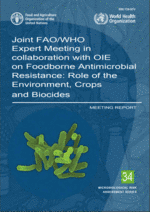Joint FAO/WHO Expert meetings on microbiological risk assessment (JEMRA)
JEMRA began in 2000 in response to requests from the Codex Alimentarius Commission and Member Countries on the assessment and control of microbiological hazards in foods.
In this context, FAO and WHO promote the Microbiological Risk Assessment (MRA) framework to inform actions and decisions aimed at reducing food-borne disease and facilitating domestic and international food trade. Microbiological Risk Assessment (MRA) allows estimating the risk to human health from specific microorganisms in foods. It is a tool to compare and evaluate different scenarios, as well as to identify the types of data necessary for estimating and optimizing mitigating interventions.
The areas of work and activities of JEMRA include:
- Risk assessments for pathogen-commodity combinations;
- Expert advice on microbiological risk management;
- Guidelines and methods for the conduct of the microbiological risk assessment process;
- Capacity development and technology transfer through courses, workshops, and the provision of risk assessment and risk management tools.
Microbiological Risk Assessment (MRA): an international approach
Risk assessment is one of the components of risk analysis - which can be defined as being an overall strategy for addressing risk - that also includes risk management and risk communication. The importance of an overlap between these three elements (risk assessment, risk management and risk communication) is well recognized, but some functional separation is also necessary. In relation to risk assessment, such separation ensures that issues are addressed in a transparent manner using a scientific basis. The risk assessment process is a means of providing an estimate of the probability and severity of illness attributable to a particular pathogen-commodity combination. The four-step process (hazard identification, hazard characterization, exposure assessment, and risk characterization) enables this to be carried out in a systematic manner, but the extent to which the steps are carried out will be dependent on the scope of the risk assessment. This can be defined clearly by the risk manager through ongoing dialogue with the risk assessor. The carrying out of an MRA, particularly quantitative MRA, is recognized as a resource-intensive task requiring a multidisciplinary approach. While MRA is becoming an important tool for assessing the risks to human health from food-borne pathogens and can be used in the elaboration of standards for food in international trade, it is not within the capacity of many, perhaps even most, countries to carry out a complete quantitative MRA.
As well as a tool that can be used in the management of the risks posed by food-borne pathogens, risk assessment can also be used to justify the introduction of more stringent standards for imported foods. A knowledge of MRA is therefore also important for both health and economic purposes, and there is a need to provide countries with the tools for understanding and, if possible, carrying out MRA. This need, combined with CAC's and CCFH's requests for scientific advice on MRA, has led FAO and WHO to undertake a programme of activities to address the issue of MRA at the international level.
MRA series

This Microbiological Risk Assessment series provides a range of data and information to those who need to understand or undertake MRA. It comprises risk assessments of particular pathogen-commodity combinations, interpretative summaries of the risk assessments, guidelines for undertaking and using risk assessment and reports addressing other pertinent aspects of MRA. This series provide a greater insight into MRA, how it is undertaken and how it can be used.
The Microbiological Risk Assessment series contains information that is useful to risk managers such as the Codex Alimentarius, governments and food regulatory agencies, scientists, food producers and industries and other people or institutions working in the area of microbiological hazards in foods, their impact on human health and food trade and their control.
In order to access and read all issues of the Microbiological Risk Assessment series, go to our Publications page and in the "Categories" drop-down menu, select "Microbiological Risk Assessment (MRA) series" then click the search button.
Training materials
Training materials
FAO/OIRSA/PAHO/ Basic course "Awareness on microbiological risk assessment"
October 3-6 2016, São Paulo, Brazil, final report of the training, 2016
The main objective of the course was to raise awareness of the principles and procedures for microbiological risk assessment in the context of risk management. Specific objectives were to explain the concept of microbiological risk assessment, explain the type of data, other resources and set-up required for microbiological risk assessment and factors influencing these and describe the work of the organizations involved in risk assessment at national or international level, their outputs and relevant resources material.
Regional Training on Enhancing Risk Communication in Food Safety
13‐15 May 2015, Bangkok, Thailand, Report of the training, FAO, 2015
This report summarises the proceedings of the training programme based on the good practices and elements of communication learnt in the technical lecture sessions – including the technical lectures, the hands-on exercises, the discussions on case studies to apply best practices of risk communication in real life food safety situations, and the role play which was organised to demonstrate how to deal with the press when a food safety incident occurs. The training exposed participants to the rapid risk communication assessment tool to enable them to assess their food safety risk communication capability and capacity at the organizational, country, regional and global levels, including practical approaches to address such needs. Some areas for support identified for capacity building at country and regional levels on risk communication are also covered.
FAO/WHO/ICD basic awareness course on Microbiological Risk Assessment (MRA), 2011
FAO/WHO together with the Industry Council for Development (ICD) developed a short introductory course on Microbiological Risk Assessment (MRA) and its use in Microbiological Risk Management (MRM). This course was developed to target food safety risk managers in governmental and parastatal organizations, as well as scientists from academia, governments or industry who are involved in risk assessment or who may not yet be very familiar with microbiological risk assessment and its application but are planning to use it in the future.
